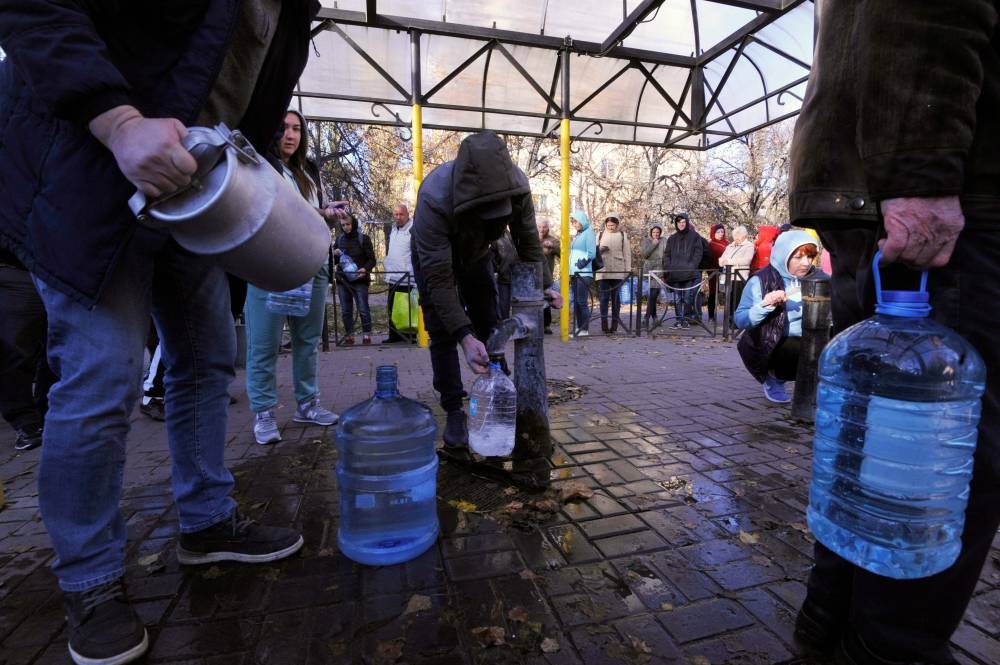KYIV, Nov 1 — Ukraine suffered sweeping blackouts and water supplies were cut to large parts of Kyiv yesterday after another wave of Russian missile strikes on key infrastructure.
The Ukrainian army said “more than 50” cruise missiles were launched at targets across the country, days after Russia blamed Ukraine for drone attacks on its fleet in the Black Sea.
The army said many missiles were shot down by air defences but Prime Minister Denys Shmygal said the barrage had caused power cuts in “hundreds” of areas across seven Ukrainian regions.
Several blasts were heard in the capital Kyiv.
After the strikes, “80 per cent of consumers” were without water in the capital, the city’s mayor Vitali Klitschko said on Telegram, while “350,000 homes” were left without electricity.
Later yesterday, the respective figures had fallen to 40 per cent and “270,000” homes, according to the mayor.
In the west of Kyiv, an AFP journalist saw more than 100 people with empty plastic bottles and containers waiting to collect water from a park fountain.
“Russian terrorists have again launched a massive attack against electricity installations,” said the deputy head of Ukraine’s presidency, Kyrylo Tymoshenko.
Ukrainian Foreign Minister Dmytro Kuleba said on Twitter: “Instead of fighting on the battlefield, Russia fights civilians.”
Ukraine’s battered energy infrastructure would be repaired with equipment from 12 countries, Kuleba said in a separate statement.
“The first batches of aid are already in Ukraine, the rest are expected in the near future,” he said.
The Russian army confirmed it had carried out cruise missile strikes and said they had all reached their intended targets.

‘Cold winter ahead’
Three missiles struck a site to the north of Kyiv, a soldier close to the target told AFP.
In a nearby town, Mila Ryabova, 39, told AFP she was woken by between eight and 10 “powerful explosions”.
“We were together with my family, preparing my daughter for school, but now there is no electricity in our house and at school,” said Ryabova, a translator.
“But we are worrying and talking about opportunities to move abroad, because there is a cold winter ahead. We may not have electricity, heat supply.”
Previous strikes this month have already destroyed around a third of Ukraine’s power stations.
In Moldova, the government said a Russian missile shot down by Ukrainian air defences fell on a village in the north of the country, but without causing any injuries.
The country’s interior ministry said the missile fell on the village of Naslavcea close to the Ukrainian border.
Grain deal
Yesterday's attack comes after Russia pulled out of a landmark agreement that allowed vital grain shipments via a maritime safety corridor.
The July deal to unlock grain exports signed between warring nations Russia and Ukraine — and brokered by Turkey and the United Nations — is critical to easing the global food crisis caused by the conflict.
But Russia announced Saturday it would suspend its participation in the deal after accusing Kyiv of a “massive” drone attack on its Black Sea fleet, which Ukraine labelled a “false pretext”.
Sevastopol in Moscow-annexed Crimea has been targeted several times in recent months and serves as the fleet’s headquarters and a logistical hub for operations in Ukraine.
Kremlin spokesman Dmitry Peskov warned that continuing grain exports without Russian participation was “hardly feasible”.
The Russian defence ministry said yesterday that it wanted “additional commitments” from Ukraine not to use the grain exports corridor for military purposes.
President Volodymyr Zelensky said Ukraine would uphold its commitment to the grain export deal, saying after talks with UN Secretary-General Antonio Guterres: “We’re ready to remain a guarantor of (global) food safety”.
Russian President Vladimir Putin meanwhile repeated the accusation that Ukraine used the grain corridor for the attack, said Kyiv had put civilian ships in danger, and called on it to guarantee “that there will be no threat to the safety of civilian vessels”.
Despite Russia’s decision to suspend its participation, at least 10 cargo ships loaded with grain and other agricultural products left Ukrainian ports yesterday, according to a marine traffic website.
“Civilian cargo ships can never be a military target or held hostage. The food must flow,” Amir Abdulla, UN Coordinator for the Black Sea Grain Initiative, said on Twitter.
Elsewhere, in Vienna, the UN nuclear watchdog, the International Atomic Energy Agency, confirmed it had begun inspections in Ukraine as part of “independent verification” of Russian allegations Kyiv is producing a so-called “dirty bomb”.
Kyiv has counter-alleged that Moscow might itself use a dirty bomb in a “false flag” attack. — AFP






















